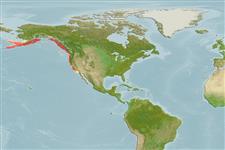Teleostei (teleosts) >
Perciformes/Cottoidei (Sculpins) >
Cottidae (Sculpins)
Etymology: Hemilepidotus: Greek, hemi = half + Greek, lepis = scale + Greek, ous, otis = ear (Ref. 45335).
More on author: Ayres.
Environment: milieu / climate zone / depth range / distribution range
Ecology
Marine; demersal; depth range 0 - 780 m (Ref. 5515). Temperate; 59°N - 32°N
Eastern Pacific: Puffin Bay, southeastern Alaska to Santa Barbara Island, southern California, USA.
Size / Weight / Age
Maturity: Lm ? range ? - ? cm
Max length : 29.0 cm TL male/unsexed; (Ref. 2850)
Dorsal spines (total): 11; Dorsal soft rays (total): 18 - 20; Anal spines: 0; Anal soft rays: 14 - 16; Vertebrae: 35. Dorsal deeply notched between third and fourth spine, and between spinous and rayed portions; caudal rounded (Ref. 6885). Color brown, often tinged with red on dorsal surface, mottled and barred with 4 dark saddles over dorsal surface (Ref. 6885).
Body shape (shape guide): elongated.
Occurs in intertidal areas and down to at least 130 or 780 m depth (Ref. 5515). Usually found in subtidal areas of exposed coasts (Ref. 2850). Feeds on crustaceans (Ref. 6885).
Life cycle and mating behavior
Maturity | Reproduction | Spawning | Eggs | Fecundity | Larvae
Eschmeyer, W.N., E.S. Herald and H. Hammann, 1983. A field guide to Pacific coast fishes of North America. Boston (MA, USA): Houghton Mifflin Company. xii+336 p. (Ref. 2850)
IUCN Red List Status (Ref. 130435: Version 2025-1)
Threat to humans
Harmless
Human uses
Tools
Special reports
Download XML
Internet sources
Estimates based on models
Preferred temperature (Ref.
123201): 3.8 - 8.1, mean 5.5 °C (based on 136 cells).
Phylogenetic diversity index (Ref.
82804): PD
50 = 0.5156 [Uniqueness, from 0.5 = low to 2.0 = high].
Bayesian length-weight: a=0.00589 (0.00281 - 0.01234), b=3.15 (2.97 - 3.33), in cm total length, based on LWR estimates for this (Sub)family-body shape (Ref.
93245).
Trophic level (Ref.
69278): 3.5 ±0.50 se; based on food items.
Resilience (Ref.
120179): Low, minimum population doubling time 4.5 - 14 years (Preliminary K or Fecundity.).
Fishing Vulnerability (Ref.
59153): Low vulnerability (19 of 100).
🛈
